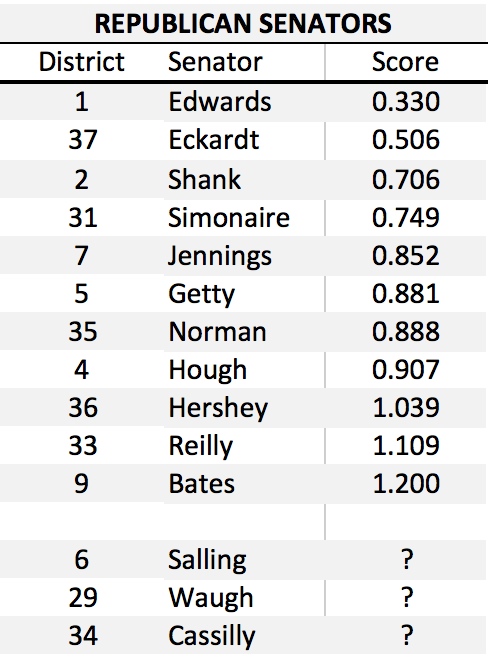 Today, 7S looks at Republicans using the data provided by Boris Shor and Nolan McCarty of state legislator ideology. Remember that a more positive score indicates a more conservative senator, so the bottom of the table are the most conservative. Put another way, the closer to zero, the more moderate the senator. These scores are for the legislator’s entire career in the General Assembly and include House as well as Senate service.
Today, 7S looks at Republicans using the data provided by Boris Shor and Nolan McCarty of state legislator ideology. Remember that a more positive score indicates a more conservative senator, so the bottom of the table are the most conservative. Put another way, the closer to zero, the more moderate the senator. These scores are for the legislator’s entire career in the General Assembly and include House as well as Senate service.
Republican scores range from 0.330 for Sen. George Edwards (R-Garrett, Allegany and Washington) and 1.200 for Senator-Elect Gail Bates (R-Howard). (Three incoming Republican senators do not have scores because they have never served in the General Assembly.) In contrast, the most progressive Democrat, Sen. Rich Madaleno (D-Montgomery), has a score of -1.864 and the most moderate Democrat, Sen. Jim Brochin (D-Baltimore County) receives a rating of -0.285.
Two of the three most moderate Republicans represent Western Maryland–Edwards and Sen. Christopher Shank (R-Washington). However, the two Eastern Shore Republicans are not close ideologically with Senator-Elect Addie Eckardt (R-Mid Shore) more moderate than Sen. Steve Hershey (R-Upper Shore).
Similarly, the two Anne Arundel senators are not an ideological matched set. Sen. Ed Reilly (R-Anne Arundel) is the second most conservative senator while Sen. Bryan Simonaire (Anne Arundel) is more moderate, though the ideological distance is smaller than for the two Shore Republicans.
Perhaps most critical is that all Republicans are notably more conservative than all Democrats. The distance between the most moderate Democrat and Republican (0.615) is greater than that between the most conservative Republican, Senator-Elect Bates, and the second most “moderate” Republican, Senator-Elect Eckardt. And even the most moderate Republcian, Sen. Edwards, is closer to all but three Republicans than the most moderate Democrat.
